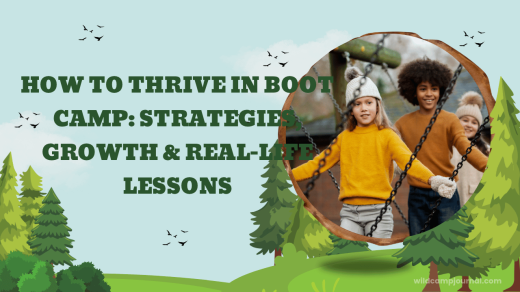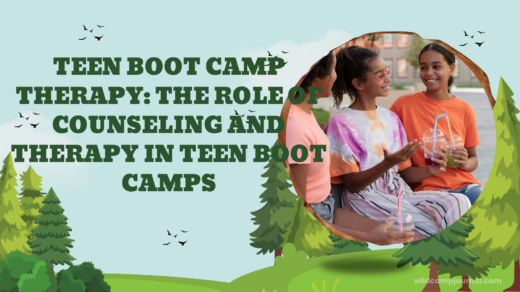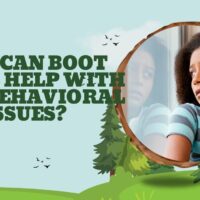Teen boot camps often evoke strong opinions—some see them as lifelines, while others question their methods.
Despite the controversy, these programs can bring about profound and lasting changes in teenagers’ lives.
By focusing on discipline, structure, and accountability, boot camps help teens navigate challenging behaviors and emotions, ultimately guiding them toward a brighter future.
Table of Contents
Why Are Teenagers Controversial Yet Impactful?

Teen boot camps often stir debate due to their strict methods and high-pressure environments.
Critics argue that the military-style discipline can be overly harsh or counterproductive for certain teens, particularly those with underlying mental health issues.
Some question whether the abrupt removal from home and immersion into such intense programs truly address the root causes of behavioral problems.
Additionally, concerns about the qualifications of staff and the potential for emotional distress have sparked calls for greater regulation.
However, supporters highlight the transformative impact these programs can have.
By providing clear rules, consistent schedules, and a focus on self-improvement, boot camps can help teens break free from negative habits.
The structure and accountability foster a sense of accomplishment, while the camaraderie with peers creates a supportive environment.
For many families, boot camps serve as a turning point, offering a path to positive change when other interventions have failed.
Overview of Positive Changes They Can Inspire
Teen boot camps are designed to inspire significant personal growth in various areas of a teenager’s life.
Participants often experience improvements in emotional resilience, learning how to handle stress and challenges more effectively.
Behavioral transformations are another hallmark of these programs, as teens develop greater accountability and self-discipline.
Physically, the emphasis on fitness and healthy living promotes long-term wellness, which is closely tied to emotional health.
Additionally, boot camps help enhance interpersonal skills through teamwork and communication exercises.
Teens learn to collaborate with others, resolve conflicts, and express themselves constructively.
The focus on goal-setting and problem-solving encourages a growth mindset, enabling participants to view challenges as opportunities for development.
By the end of the program, many teens leave with improved self-esteem, clearer aspirations, and the tools they need to build a more successful future.
Emotional and Behavioral Transformation
Teen boot camps are often designed to help young individuals navigate their emotional landscapes and address problematic behaviors.
Many teenagers enter these programs with a history of emotional struggles, ranging from low self-esteem to difficulty managing stress.
Through structured activities, therapeutic interventions, and a supportive environment, boot camps aim to create meaningful emotional and behavioral transformations.
By fostering resilience and accountability, these programs empower teens to build a stronger foundation for their future.
Developing Emotional Resilience
One of the most significant benefits of teen boot camps is their ability to instill emotional resilience.
Resilience is the capacity to recover quickly from difficulties and adapt to challenging situations—a crucial life skill for teenagers as they transition into adulthood.
Here’s how boot camps contribute to this process:
Teaching Teens to Handle Stress
Stress is an unavoidable part of life, but many teens struggle to cope with it effectively.
Boot camps provide a controlled environment where teens face challenges, such as rigorous physical activities, group dynamics, and problem-solving tasks.
These activities teach participants how to stay calm under pressure and approach obstacles with a problem-solving mindset.
Instructors and mentors often model healthy coping mechanisms, such as mindfulness, breathing exercises, or breaking tasks into smaller steps.
Teens gradually learn that stress can be managed rather than feared, allowing them to develop a proactive approach to life’s challenges.
These lessons often extend beyond the camp setting, helping participants handle academic pressure, family conflicts, and future workplace stressors.
Building Self-Confidence
Self-confidence is another key area of growth in boot camps.
Many teenagers struggle with self-doubt, whether due to past failures, peer pressure, or a lack of positive reinforcement.
Boot camps address this by setting achievable goals and celebrating small victories along the way.
For example, a teen might be challenged to complete a physically demanding obstacle course or lead a group project.
Success in these tasks, coupled with encouragement from peers and mentors, reinforces the idea that they are capable of overcoming challenges.
This boost in confidence can translate into other areas of life, such as academics, sports, or social interactions.
Moreover, teens are often encouraged to reflect on their progress, helping them recognize their strengths and potential.
This process not only builds self-esteem but also motivates them to tackle future challenges with a sense of assurance.
Emotional resilience and confidence, developed in this structured and supportive environment, lay the groundwork for healthier, more fulfilling lives.
Addressing Behavioral Issues
Teen boot camps are designed to help young individuals overcome problematic behaviors that may be hindering their personal growth.
Many teenagers struggle with defiance, impulsivity, or difficulty managing their emotions.
Through structured programs, boot camps create an environment where these behaviors can be addressed constructively, allowing teens to replace negative patterns with healthier alternatives.
Tackling Defiance and Anger Management
Defiance and anger are common challenges for many teenagers, often rooted in underlying emotional struggles or external stressors.
Boot camps address these issues by teaching teens constructive ways to express their emotions.
This is achieved through:
- Therapeutic Interventions: Many boot camps incorporate therapy sessions or group discussions where teens can explore the root causes of their anger and defiance. By identifying triggers, they learn strategies to respond calmly rather than reacting impulsively.
- Conflict Resolution Skills: Through role-playing exercises and real-world scenarios, teens practice how to handle disagreements without resorting to aggression. This fosters better communication and helps them navigate conflicts with peers, family, and authority figures.
- Physical Outlets for Emotions: Physical activities like obstacle courses or team sports are used as productive ways for teens to release pent-up frustration. These activities not only help them manage anger but also improve self-control and patience.
Over time, teens begin to recognize that defiance and anger can be managed through healthier outlets, which empowers them to handle challenges more effectively.
Encouraging Accountability for Actions
One of the most transformative aspects of boot camps is their emphasis on accountability.
Many teens struggle to connect their actions with their consequences, often blaming external factors or avoiding responsibility.
Boot camps instill a sense of personal accountability through structured exercises and clear expectations.
- Learning from Mistakes: Teens are taught to reflect on their behaviors and understand how their choices affect themselves and others. This reflection process helps them develop a sense of ownership over their actions.
- Consistent Feedback: Boot camp staff provide immediate and constructive feedback, reinforcing the importance of taking responsibility for mistakes and celebrating positive changes.
- Assigning Leadership Roles: Teens may be given responsibilities such as leading a group activity or managing a task. These roles encourage them to take initiative and understand the impact of their contributions on the team.
By fostering accountability, teens develop a stronger sense of integrity and responsibility, which benefits them in all areas of life, from school to family relationships.
This critical skill ensures they are better equipped to make thoughtful decisions and grow into responsible adults.
Physical Fitness and Health

Physical fitness and health are foundational aspects of many teen boot camps. These programs recognize the strong connection between physical well-being and overall personal development.
By engaging in consistent physical activities and adopting healthier habits, teens can experience significant improvements in their physical, emotional, and mental health.
Let’s dive deeper into the two major components: promoting a healthy lifestyle and boosting physical endurance.
Promoting a Healthy Lifestyle
Teen boot camps emphasize instilling lifelong habits that support a healthy lifestyle.
These include not only physical activities but also proper nutrition and an understanding of how daily choices impact overall well-being.
Structured Physical Activities
One of the core features of boot camps is their focus on structured physical activities.
From early-morning drills to team sports, these activities ensure that teens remain active throughout the day.
Such routines help improve cardiovascular health, build muscle strength, and enhance flexibility.
Physical exercises also serve as excellent outlets for releasing pent-up energy and reducing stress.
Over time, teens develop a habit of staying active, which can lead to better health outcomes in adulthood.
Moreover, participating in group activities such as obstacle courses or fitness challenges fosters a sense of camaraderie and teamwork.
These exercises not only build physical strength but also teach teens the importance of collaboration and mutual encouragement.
Balanced Nutrition Focus
In addition to physical activities, many boot camps educate teens on the importance of balanced nutrition.
Participants are often introduced to the basics of healthy eating, such as understanding portion sizes, the role of macronutrients (carbohydrates, proteins, and fats), and the value of fresh, unprocessed foods.
Programs may include meal planning sessions or cooking workshops to help teens appreciate the impact of diet on their energy levels, focus, and mood.
For many participants, these lessons provide a wake-up call about the importance of proper nutrition in achieving their personal and physical goals.
Boosting Physical Endurance
Developing physical endurance is another crucial aspect of boot camp programs.
Endurance not only improves the body’s ability to perform sustained physical activities but also fosters mental resilience.
How Physical Activities Improve Mental Health
Physical fitness plays a pivotal role in enhancing mental health.
Engaging in regular exercise triggers the release of endorphins, often referred to as “feel-good hormones.”
These chemicals naturally reduce stress, anxiety, and symptoms of depression.
Additionally, physical challenges, such as running long distances or completing rigorous drills, teach teens to push through discomfort and persevere, which can significantly boost their self-esteem and sense of accomplishment.
The mental clarity and emotional balance gained from consistent physical activity create a ripple effect, helping teens perform better academically, socially, and personally.
This connection between physical exertion and emotional stability reinforces the importance of maintaining an active lifestyle.
Connection Between Fitness and Discipline
Fitness routines require consistency, effort, and a commitment to improvement—all of which build discipline.
In boot camps, teens follow strict schedules that integrate workouts, rest periods, and recovery times.
Learning to adhere to these routines teaches them the value of persistence and time management.
For example, completing a set number of push-ups or improving their running time often serves as a tangible representation of their progress.
These small victories instill a sense of discipline that extends beyond physical activities and into other areas of their lives, such as academic pursuits or personal responsibilities.
Fostering Discipline and Responsibility

One of the core benefits of teen boot camps is their ability to instill discipline and a sense of responsibility in participants.
Many teens enter these programs with little understanding of how their choices and habits impact their lives and those around them.
Boot camps create an environment where discipline isn’t just enforced but taught as a valuable life skill.
Through structured routines, clear expectations, and accountability measures, teens learn how to manage themselves effectively and take ownership of their actions.
Teaching Discipline Through Structure
Boot camps operate on strict schedules, where every hour of the day is accounted for.
This structure introduces teens to the concept of time management and the importance of following a routine.
Activities such as wake-up calls, meal times, exercise sessions, and study periods occur at the same time daily, emphasizing consistency and reliability.
Over time, this helps participants develop a sense of predictability and order that they can carry into their everyday lives.
The Role of Routine in Personal Growth
Routine plays a vital role in helping teens establish good habits and reduce stress.
Knowing what to expect each day allows them to focus on self-improvement rather than feeling overwhelmed by uncertainty.
For example, regularly scheduled activities like journaling or team-building exercises provide a framework for personal growth.
Teens begin to realize that consistency, rather than bursts of effort, is key to achieving long-term goals.
Overcoming Procrastination Habits
Many teens struggle with procrastination, often delaying tasks until deadlines loom.
Boot camps address this by encouraging immediate action.
The structured environment pushes participants to complete assigned tasks promptly, whether it’s making their bed, completing a fitness drill, or participating in a group activity.
Over time, they develop an understanding that procrastination only adds unnecessary stress and hinders their progress.
Responsibility as a Core Value
Responsibility is another cornerstone of personal development emphasized in teen boot camps.
Teens are often given roles and responsibilities that mimic real-world scenarios, teaching them the value of accountability.
These lessons extend beyond the program, helping them become more dependable individuals in their family, school, and community.
Assigning Roles to Instill Accountability
Boot camps often assign specific roles to participants, such as team leader, equipment manager, or group mediator.
These roles come with clear expectations, and teens must fulfill their duties to ensure the success of the group.
For instance, a team leader might be responsible for organizing activities, while an equipment manager ensures all supplies are accounted for.
These roles teach participants the importance of reliability and how their efforts contribute to collective goals.
Helping Teens Recognize Consequences
One of the most impactful lessons teens learn at boot camps is the direct relationship between their actions and the outcomes.
Whether it’s receiving praise for completing a task or facing a consequence for neglecting responsibilities, the cause-and-effect relationship becomes clear.
For example, if a teen fails to prepare for a group activity, the entire team may face a setback.
This tangible feedback helps participants understand how their choices influence not only themselves but those around them.
It encourages them to think critically before acting and to take ownership of their decisions.
Improving Interpersonal Skills
Teen boot camps play a pivotal role in enhancing interpersonal skills, which are essential for personal and professional success.
By placing teens in group settings with structured activities, these programs foster collaboration, empathy, and effective communication.
Participants learn to navigate social dynamics, building relationships that rely on trust and mutual respect.
Learning Teamwork
Group activities fostering collaboration
In a boot camp setting, teamwork becomes a daily practice.
Teens engage in group challenges like building structures, navigating obstacle courses, or solving puzzles that require cooperation.
These activities teach participants to appreciate different perspectives, value each other’s strengths, and understand the importance of compromise.
By working toward common goals, teens learn that success often depends on how well they can collaborate with others.
Sharing responsibilities to achieve goals
Boot camps assign shared tasks, such as planning meals, organizing activities, or completing team challenges.
Each team member is given a specific role, ensuring everyone contributes to the group’s success.
This experience emphasizes accountability and shows how individual efforts impact collective achievements.
Teens begin to recognize the power of shared responsibility, an invaluable skill that translates to school, work, and family life.
Enhancing Communication
Open dialogue with peers and mentors
Effective communication is a cornerstone of any relationship, and boot camps prioritize its development.
Teens are encouraged to openly express their thoughts, feelings, and concerns in a judgment-free environment.
Interactions with peers and mentors during one-on-one sessions or group discussions teach them how to articulate their ideas clearly and listen actively to others.
This practice not only builds confidence but also strengthens their ability to form meaningful connections.
Resolving conflicts effectively
Conflict is a natural part of human interaction, and boot camps provide teens with the tools to handle it constructively.
Through role-playing scenarios and guided discussions, participants learn to approach disagreements calmly, focusing on finding solutions rather than escalating tensions.
This skill helps teens manage conflicts with peers, authority figures, and family members, fostering healthier relationships in the long run.
Building a Growth Mindset
A growth mindset is the belief that abilities and intelligence can be developed through dedication and hard work.
For teenagers, cultivating this mindset is transformative, as it encourages them to see challenges as opportunities rather than insurmountable obstacles.
Boot camps often focus on fostering this mindset by guiding teens through structured activities and reflective exercises that emphasize personal development.
Shifting Perspectives
One of the most impactful lessons taught in teen boot camps is the ability to shift perspectives.
Many teens arrive at these programs feeling stuck in negative patterns or beliefs about themselves and the world around them.
Through experiences like teamwork, problem-solving challenges, and guided self-reflection, participants are encouraged to think differently.
For example, rather than viewing a mistake as a failure, they learn to see it as a learning opportunity.
By reframing their thoughts, teens become more open to new possibilities and better equipped to adapt to life’s changes.
Learning from Challenges
Facing and overcoming challenges is a core aspect of boot camps.
Teens are put into situations that test their limits, whether it’s completing a rigorous physical task or navigating interpersonal conflicts.
These experiences teach them resilience—how to pick themselves up after a setback and try again.
By reflecting on what went wrong and considering how to improve, teens gain valuable insights into their own strengths and weaknesses.
This process builds confidence and a sense of competence, laying the groundwork for future success.
Viewing Failures as Opportunities
In a growth-oriented environment, failure is not the end—it’s a stepping stone.
Boot camps help teens reframe failure as a chance to learn and grow.
For instance, if a teen struggles to complete a team task, they might be encouraged to analyze what happened, seek feedback, and try a different approach next time.
This perspective helps teens develop resilience and perseverance, qualities that are essential for tackling life’s bigger challenges.
Over time, they learn that setbacks are not permanent but rather opportunities to refine their skills and strategies.
Setting and Achieving Goals
Goal-setting is a fundamental part of building a growth mindset.
At boot camps, teens are encouraged to establish both short-term and long-term goals.
Whether it’s mastering a skill, improving physical fitness, or strengthening relationships, the process of setting clear objectives helps teens stay focused and motivated.
Encouraging Self-Motivation
A key to achieving goals is self-motivation.
At boot camps, teens are taught to take ownership of their ambitions.
Rather than relying on external pressures or rewards, they are encouraged to find personal meaning and value in their efforts.
For example, if a teen wants to improve their endurance during physical activities, the program might emphasize personal pride and the health benefits of achieving that goal.
By internalizing their motivations, teens are more likely to remain committed and see tasks through to completion.
Tracking Progress Over Time
To reinforce the importance of growth, boot camps often incorporate tools for tracking progress.
Teens might keep journals, participate in regular evaluations, or reflect on milestones achieved during the program.
This process helps them see how far they’ve come, which boosts confidence and provides a tangible sense of accomplishment.
Tracking progress also teaches teens how to measure success effectively, a skill that can be applied to academic, personal, and professional goals in the future.
Long-Term Positive Outcomes
Teen boot camps often serve as a turning point in a young person’s life, providing them with the tools and mindset to make better choices for the future.
These programs aim to not only address immediate challenges but also to lay a foundation for sustained personal and professional growth.
Here’s how boot camps foster long-term positive outcomes:
Reduced Risk of Negative Behaviors
One of the most significant long-term benefits of teen boot camps is the reduction in risky behaviors.
Many teens enter these programs struggling with habits or peer influences that steer them toward destructive paths.
Through structured guidance, they learn healthier coping mechanisms and strategies to resist temptations.
Avoiding Substance Abuse
Substance abuse is a common concern among troubled teens.
Boot camps provide a controlled, substance-free environment that allows participants to detoxify both physically and mentally.
Through counseling sessions and educational workshops, teens gain a deeper understanding of the dangers of drug and alcohol abuse.
They also learn strategies to resist peer pressure, making it easier to avoid these pitfalls when they return to everyday life.
Steering Clear of Delinquency
Many teens in boot camps have a history of engaging in delinquent behaviors such as theft, vandalism, or truancy.
These programs instill a sense of accountability and respect for rules and authority.
By teaching teens the value of lawful behavior and the consequences of poor decisions, boot camps help participants stay on the right side of the law.
This often translates into a cleaner slate and fewer legal troubles down the road.
Better Academic and Career Focus
Another powerful outcome of teen boot camps is the renewed focus on education and career development.
Many teens leave these programs with a clearer sense of direction and purpose, which helps them excel academically and prepare for their future careers.
Improved Attention in Studies
Teens often struggle with focus and motivation when it comes to academics, especially if they’re dealing with emotional or behavioral challenges.
Boot camps emphasize the importance of discipline and time management, skills that are directly transferable to schoolwork.
By fostering a routine and encouraging accountability, these programs help teens develop the ability to concentrate better on their studies, leading to improved grades and academic performance.
Enhanced Decision-Making Skills
Boot camps are designed to help teens make better choices by teaching them critical thinking and problem-solving skills.
Whether it’s setting priorities, weighing options, or considering long-term consequences, participants leave with a stronger ability to make informed decisions.
This skill is invaluable not only in academics but also in choosing career paths and navigating life’s challenges with confidence.
Final Thoughts
Teen boot camps offer a unique and structured approach to helping young individuals overcome behavioral challenges, build discipline, and develop essential life skills.
The journey through these programs is often transformative, leading to emotional growth, improved physical health, and enhanced interpersonal skills.
By creating a challenging yet supportive environment, boot camps encourage teens to step out of their comfort zones, take responsibility for their actions, and recognize their potential for success.
Boot camps provide a range of advantages, including:
- Emotional and Behavioral Growth: Teens learn how to manage stress, control anger, and embrace accountability.
- Improved Physical Fitness: Regular physical activities build strength, stamina, and a healthier lifestyle.
- Discipline and Responsibility: Structured routines instill habits that carry into adulthood.
- Enhanced Social Skills: Team-based activities and mentorship improve communication and collaboration.
- A Growth Mindset: Teens leave with tools to view challenges as opportunities and set meaningful goals for the future.
These benefits collectively empower teenagers to lead more focused, positive, and productive lives, equipping them to face life’s hurdles with confidence.
However, not all boot camps are created equal.
It’s essential for parents to carefully evaluate the options available to find a program that aligns with their teen’s specific needs, challenges, and personality.
Consider factors such as the camp’s philosophy, the qualifications of its staff, and its success rates.
Personalized programs that address a teen’s unique circumstances and provide ongoing support can significantly increase the chances of sustained success after the program ends.
A well-chosen boot camp isn’t just a temporary intervention—it can be the catalyst for long-term growth and positive change in a teenager’s life.
FAQs
What are the Positive Changes from Teen Boot Camps?
Teen boot camps can instill discipline, improve behavior, and boost self-esteem in troubled teens.
Why boot camp is better?
Boot camps offer intensive therapy, a structured environment, and accountability, leading to rapid behavioral changes and long-term improvements.
What are the pros of boot camps?
Boot camps offer quick results, professional staff, and individualized attention, making them an effective option for some teens.
Are teen boot camps suitable for every teenager?
No, teen boot camps are not suitable for every teenager. They may not be appropriate for those with severe mental health conditions or substance abuse issues.
How long do the effects of boot camps last?
The long-term effectiveness of boot camps can vary greatly depending on individual factors and the availability of aftercare support.
Can parents participate in the program?
Some boot camps offer family therapy and parent education programs, allowing parents to participate in their child’s treatment.
Are there alternatives to boot camps?
Yes, there are several alternatives to boot camps, including:
Therapy and Counseling: Individual or family therapy can address underlying issues.
Residential Treatment Centers: These centers provide a structured environment with therapeutic interventions.
Outpatient Programs: Less intensive programs that allow teens to live at home.
What factors should parents consider when choosing a boot camp?
When choosing a boot camp, parents should consider the following factors:
Accreditation and Licensing: Ensure the boot camp is accredited and licensed.
Therapeutic Approach: Consider the specific therapeutic approaches used.
Staff Qualifications: Assess the qualifications and experience of the staff.
Aftercare Programs: Inquire about aftercare support to maintain progress.
Cost: Evaluate the cost and available financial aid options.


















